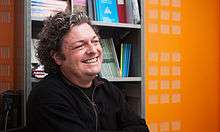Henkjan Honing
| Henkjan Honing | |
|---|---|
 | |
| Born |
May 15, 1959 Hilversum, Netherlands |
| Nationality | Dutch |
| Alma mater | City University, London, UK |
| Known for | Rhythm perception, timing and tempo; Mechanisms underlying musicality |
| Awards | Distinguished Lorentz Fellow 2013/14, a prize granted by the Lorentz Center for the Sciences and the Netherlands Institute for Advanced Study in the Humanities and Social Sciences. |
| Scientific career | |
| Fields | Music cognition |
| Institutions | University of Amsterdam; Amsterdam Brain and Cognition, Institute for Logic, Language and Computation; Institute for Advanced Study (UvA-IAS) |
| Thesis | (1991) |
| Academic advisors | Eric Clarke (musicologist), H. Christopher Longuet-Higgins |
| Website | http://www.mcg.uva.nl/hh |
Henkjan Honing (born 1959 in Hilversum) is a Dutch researcher. He is professor of Music Cognition at both the Faculty of Humanities and the Faculty of Science of the University of Amsterdam (UvA). He conducts his research under the auspices of the Institute for Logic, Language and Computation (ILLC), and the University of Amsterdam’s Brain and Cognition (ABC) center.
Honing obtained his PhD at City University (London) in 1991 with research into the representation of time and temporal structure in music. During the period between 1992 and 1997, he worked as a KNAW Research Fellow (Academieonderzoeker) at the University of Amsterdam’s Institute for Logic, Language and Computation (ILLC), where he conducted a study on the formalization of musical knowledge. Up until 2003, he worked as a research coordinator at the Nijmegen Institute for Cognition and Information (NICI; now F.C. Donders Centre for Cognitive Neuroimaging) where he specialized in the computational modeling of music cognition. In 2007, he was appointed Associate Professor in Music Cognition at the University of Amsterdam’s Musicology capacity group. In 2010 he was awarded the KNAW-Hendrik Muller chair, designated on behalf of the Royal Netherlands Academy of Arts and Sciences (KNAW). In 2012 he was appointed strategic Professor of Cognitive and Computational Musicology, and in 2014 he became full professor in Music Cognition at both the Faculty of Humanities and the Faculty of Science of the University of Amsterdam. In 2013 he received a Distinguished Lorentz Fellowship, a prize granted by the Lorentz Center for the Sciences and the Netherlands Institute for Advanced Study in the Humanities and Social Sciences.
Henkjan Honing authored over 200 scientific publications[1] in the areas of music cognition, musicality and music technology, and published several books for a general audience, including Iedereen is muzikaal. Wat we weten over het luisteren naar muziek (Nieuw Amsterdam, 2009/2012), published in English as Musical Cognition: A Science of Listening (Routledge, 2011/2013), and Aap slaat maat. Op zoek naar de oorsprong van muzikaliteit bij mens en dier (Nieuw Amsterdam, 2018) that will appear in English as The Evolving Animal Orchestra: In Search of What Makes Us Musical (2019, The MIT Press). In 2018 a research agenda on the topic of musicality appeared as The Origins of Musicality (2018, The MIT Press).
Henkjan is the older brother of the saxophonist Yuri Honing.
Selected studies
- Honing, H. (2018). The Origins of musicality. The MIT Press. ISBN 9780262037457.
- Honing, H.; ten Cate, C.; Peretz, I.; Trehub, S. (2015). "Without it no music: Cognition, biology, and evolution of musicality". Philosophical Transactions of the Royal Society B: Biological Sciences. 370: 1664. doi:10.1098/rstb.2014.0088.
- Henkjan Honing (2011/2013): Musical Cognition. A Science of Listening. New Brunswick, N.J.: Transaction Publishers[2]
- Honing, H. (2013). The structure and interpretation of rhythm in music. In Deutsch, D. (ed.), Psychology of Music, 3rd edition (pp. 369–404). London: Academic Press. doi 10.1016/B978-0-12-381460-9.00009-2
- Honing, H.; Bouwer, F.; Prado, L.; Merchant, H. (2018). "Rhesus Monkeys (Macaca mulatta) Sense Isochrony in Rhythm, but Not the Beat: Additional Support for the Gradual Audiomotor Evolution Hypothesis". Frontiers in Neuroscience. doi:10.3389/fnins.2018.00475.
- Complete list of publications[3]